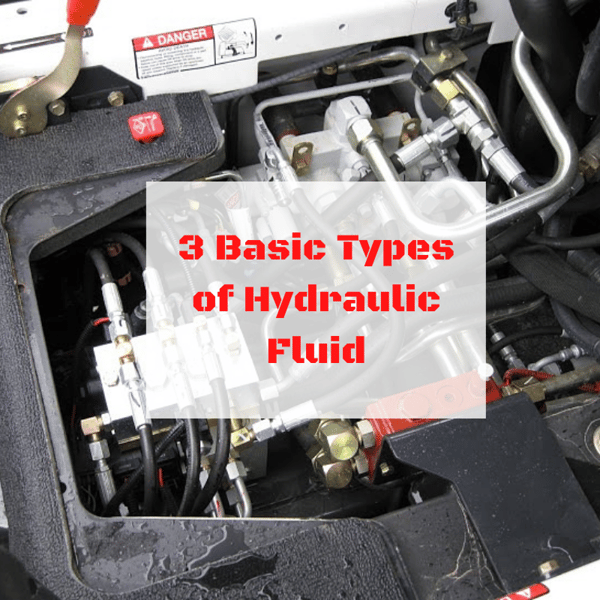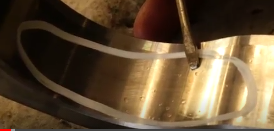There are a ton of different hydraulic fluids on the market -- how do you know which one is the right one for your equipment? In this Shop Talk Blog post, we're going to look at the three basic types of hydraulic fluid. And expect some more blog posts on the subject!

Here are a few other Shop Talk Blog posts you might be interested in:
Common Characteristics of Hydraulic Fluid
There are certain properties that all hydraulic fluids must possess, regardless of type or base, including ...
- Incompressibility (compression leads to inefficient hydraulic performance)
- Resistance to corrosion and wear (both of which will shorten the life of your hydraulic equipment)
- Consistent viscosity and performance within a defined range of operating temperatures (consistency is extremely important)
Other properties that may be important include resistance to factors such as fire, water contamination, and cavitation. In addition, some operating conditions can require biodegradability or non-toxicity.
Certain types of hydraulic fluid provide these properties at lower cost or more effectively than others, which is why it's important to understand more about how these fluids are classified.
Types of Hydraulic Fluid
The three basic categories of hydraulic fluid are ...
- Petroleum-based (aka, mineral-based)
- Water-based
- Synthetic
Each of these offers its own benefits, and has its own drawbacks.
Petroleum-Based Hydraulic Fluids
Petroleum-based hydraulic fluids (also called mineral-based) are made by refining crude oil. The performance characteristics of these hydraulic fluids are dependent on three things:
- Quality of the original crude oil
- Refining process
- Additives used
This is the most commonly used type of hydraulic fluid, the least expensive option, and comes in the widest variety. In addition, petroleum-based hydraulic fluids can also contain dyes that make it easier to spot leaks.

Water-Based Hydraulic Fluids
Water-based hydraulic fluids are more expensive than petroleum-based fluids but still cheaper than synthetic options. They are primarily used when there is a high probability of fire but they don't provide the same wear protection as petroleum-based or synthetic fluids.
The three basic categories of water-based hydraulic fluids are ...
- Oil-in-water emulsions
- Water-in-oil emulsions
- Water glycol blends
Note that an emulsion is a dispersion of one liquid within another, which in these cases would be either oil dispersed in water or water dispersed in oil.
Synthetic Hydraulic Fluids
Synthetic hydraulic fluids are made from chemically produced base fluids. These fluids can be formulated to provide characteristics such as oxidation stability, fire resistance, or biodegradability without requiring additives (as is the case with petroleum-based fluids).
Synthetic hydraulic fluids offer the best performance but, at the same time, are the most costly. While they work extremely well for applications involving high pressures or extreme temperatures, they can be toxic and cause damage to seals if the seal material is incompatible.
Critical Properties for Choosing a Hydraulic Fluid
When it comes to selecting a hydraulic fluid, there are also certain attributes that must always be considered: viscosity and viscosity index, wear resistance, and oxidation stability. And these attributes apply regardless of the type of fluid.
Viscosity refers to the thickness of the fluid. A low viscosity fluid, such as water, flows much easier than a high viscosity fluid such as syrup. Higher viscosity hydraulic fluids, therefore, are going to be thicker than lower ones.
The viscosity index (VI) deals with how the viscosity of fluid changes with temperature. A hydraulic fluid with a higher VI will maintain its viscosity over a wider temperature range. This property can be especially important when a hydraulic fluid will be used in an environment where temperatures are likely to be high.
Wear resistance is the ability of hydraulic fluid to reduce the rate of wear (e.g., scratching, scuffing, abrasion) between two surfaces that are coming into contact. In a radial piston final drive motor, for example, wear occurs between the cams and the cam ring.

Oxidation stability refers to chemical reactions with oxygen that are induced by heat. Oxidation leads to difficulties with by-products such as sludge and varnish. A hydraulic fluid that has good oxidation stability resists these reactions.
Conclusion
At Texas Final Drive, we want you to see the best performance possible out of your hydraulic equipment -- including, of course, your final drive motors. This is going to be the first of a multi-part blog post series dealing in depth with hydraulic fluids.


